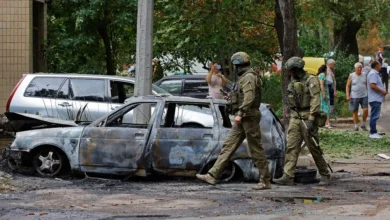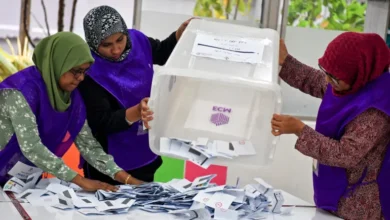French judges to decide about 300 possible Indian victims of trafficking

Judges will decide Sunday whether about 300 Indian citizens, suspected of being victims of human trafficking, should continue to be sequestered in a small French airport.
En route to Central America, the passengers have been held at Vatry airport — in Champagne country — since Thursday after a dramatic police operation prompted by a tip about a possible human trafficking scheme, authorities said.
The passengers will appear before judges throughout the day, who will decide whether to extend their detention in the airport, according to the administration for the Marne region. If they can’t be held any longer, they will be free to leave the country.
“I don’t know if this has ever been done before in France,” Francois Procureur, lawyer and head of the Châlons-en-Champagne Bar Association, told BFM TV on Saturday. The situation is urgent because “we cannot keep foreigners in a waiting area for more than 96 hours. Beyond that, it is the liberty and custody judge who must rule on their fate,” he said.
This period can be extended to eight days if a judge approves, then another eight days in exceptional circumstances.
With this urgency in mind, Procureur said four hearings will be scheduled simultaneously, with four judges, four clerks and at least four lawyers taking part in proceedings as well as interpreters. “We are all mobilized,” he said.
The passengers included children and families. The youngest is a toddler of 21 months, and among the children are several unaccompanied minors, according to the local civil protection agency.
Two of the passengers have been detained as part of a special investigation into suspected human trafficking by an organized criminal group, according to the Paris prosecutor’s office. Prosecutors wouldn’t comment on what kind of trafficking was alleged, or whether the ultimate destination was the US, which has seen a surge in Indians crossing the Mexico-US border this year.
The 15 crew members of the Legend Airlines charter flight — an unmarked A340 plane en route from Fujairah airport in the United Arab Emirates to Managua, Nicaragua — were questioned and released, according to a lawyer for the Romania-based airline.
According to an official with the Marne administration, the passengers initially remained in the plane, surrounded by police on the tarmac, but were then transferred into the main hall of the airport to sleep.
Legend Airlines lawyer Liliana Bakayoko said the company was cooperating with French authorities and has denied any role in possible human trafficking. She said the airline ‘’has not committed any infraction.’’
A “partner” company that chartered the plane was responsible for verifying identification documents of each passenger, and communicated their passport information to the airline 48 hours before the flight, Bakayoko told The Associated Press.
The customer had chartered multiple flights on Legend Airlines from Dubai to Nicaragua, and a few other flights had already made the journey without incident, she said. She would not identify the customer, saying only that it is not a European company.
The US government has designated Nicaragua as one of several countries deemed as failing to meet minimum standards for eliminating human trafficking.
Nicaragua has also been used as a migratory springboard for people fleeing poverty or conflict in the Caribbean as well as far-flung countries in Africa or Asia, because of relaxed or visa-free entry requirements for some countries.
Sometimes charter flights are used for the journey.
From there, the migrants travel north by bus with the help of smugglers.
The influx of Indian migrants through Mexico has increased from fewer than 3,000 in 2022 to more than 11,000 from January to November this year, according to the Mexican Immigration Agency.
Indian citizens were arrested 41,770 times entering the US illegally from Mexico in the US government’s budget year that ended September 30, more than double from 18,308 the previous year.










